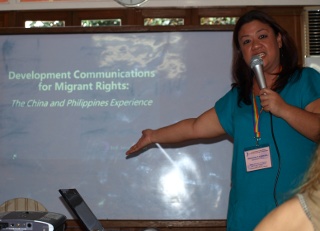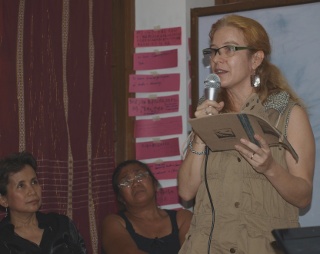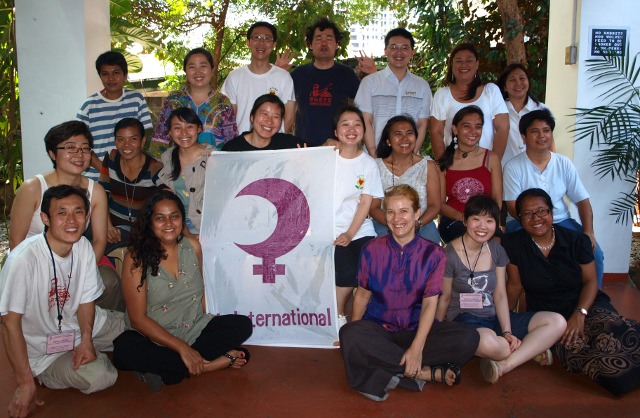by Sheryl Ho
Based on its 36 years experience, Isis International, a feminist development communication organization, launched its Activists School for Feminist Development Communications in Manila, Philippines on April 5th 2010.
 The development of new media and information, communication and technologies (ICTs) has drastically changed the way of social mobilization and organizing, as well as movement building and advocacy. This Activist School aims to strategically utilize the media and ICTs to strengthen social movement and advocacies. It conducts in-house and on-site training seminars bringing together women activists and development practitioners to share and learn from each other on the theory and practice of development communication to strengthen cause-oriented advocacies on the various issues. As well, the Actvist School aims to develop and sharpen skills in community radio, journalism and publication, film and video, theatre, and convergent media technology for networking.
The development of new media and information, communication and technologies (ICTs) has drastically changed the way of social mobilization and organizing, as well as movement building and advocacy. This Activist School aims to strategically utilize the media and ICTs to strengthen social movement and advocacies. It conducts in-house and on-site training seminars bringing together women activists and development practitioners to share and learn from each other on the theory and practice of development communication to strengthen cause-oriented advocacies on the various issues. As well, the Actvist School aims to develop and sharpen skills in community radio, journalism and publication, film and video, theatre, and convergent media technology for networking.
Isis International Executive Director, Ms Cai Yiping said at the launching, “Since it's founding in 1974, for 36 years Isis International has been working through media and information and communication towards achieving women’s human rights and facilitating networking and information sharing of women’s movements and the social movement at large.”
Two years ago, Isis finished a three-year five-country research project, “People’s Communications for Development”, in the Asia Pacific region India, Thailand, Philippines, Fiji and Papua New Guinea to find out how intermediary groups use new ICTs and traditional communication tools in interacting with grassroots women and to determine the most effective communication tools for grassroots women’s empowerment. The research findings showed that the most effective communication tools to reach grassroots women are radio followed by theatre, film and oral face to face communication. The same research also surfaced the demands from the women’s groups on the convergence of traditional and new media and communication technologies.
“The Activist School is our response to the needs of these movements. And we are looking forward to working with the activists from Asia Pacific region to make the school an empowering and energising venue in our activism and unwavering commitments.” Cai Yiping added at the launch.
The launch of the Activist School followed by an open forum on “Developing Communications for Migrant Rights: The China and Philippines Experience,” attended by the School's first group of participants from mainland China and Hong Kong and Filipino activists, development practitioners and academics.
Speakers included, Mr Xu Guojian and Ms Wang Baoli, migrant rights advocates from Beijing in Northern China and Shenzhen in Southern China, respectively. The activists shared their experiences in organising and mobilising their communities via diverse media and communication strategies, including video, theater, music, magazine, etc; while Professor Jack Qui from the Chinese University of Hong Kong, highlighted a five-year study on “Marginal Groups and Media Empowerment: A Study of Chinese Migrants”.
 He said the goal of the study was to “record and analyse the multifarious ways through which Chinese migrants and their organisations can empower themselves by acquiring the communication skills and applying them while dealing with government agencies at various levels and engaging in public discussions of public affairs.”
He said the goal of the study was to “record and analyse the multifarious ways through which Chinese migrants and their organisations can empower themselves by acquiring the communication skills and applying them while dealing with government agencies at various levels and engaging in public discussions of public affairs.”
Reactors from the Philippines included Ms Malou Alcid, Board Trustee – Kanlungan Centre Foundation and ARMMNet Member; Ms Nere Guerrero, General Secretary of SAMAKANA – a NGO working with urban poor community, and Ms Bianca Miglioretto, Isis International Community Radio Officer.
Ms Alcid shared the activities which individuals and organisations have organised since the 1980s to promote the rights and fight of overseas Filipinos for better and just living conditions. She added that for the Philippines, migrant workers are an important human resource as they make up about 20% of the total Filipino labour force.
Ms Guerrero, an internal migrant herself from a farming community, presented two solutions to the migration problem within the Philippines. These included “true land reform so that farmers need not have to migrate to Manila to find work, and the need for genuine industrialisation that will generate employment for Filipinos so that they would not have to migrate to find work.
Ms Miglioretto said that often in advocacy, much effort is centered on reporting to the outside world that people forget to report within the community itself. For a country like China, alternative media, such as community radio, can be used to reach those workers and fill the information gap or broken information structures.
Isis International's Board of Trustee Chairperson, Ms Luz Martinez, pointed out that more research is needed, especially with gender perspectives, given that global women are the fastest growing migrants.
This year, Isis Activist School for Feminist Development Communications will host a series of workshops for women's NGOs from Asia and Pacific on the issues of peace and conflict, gender and climate change, and violence against women, among others. Announcements and calls for application for each school will be available on Isis International website. (www.isisinternational.org)






 The
The 
 Isis Resource Center holds one of the largest feminist collections of materials in the Global South. With 40 years of publication experience, Isis holds a vast collection.
Isis Resource Center holds one of the largest feminist collections of materials in the Global South. With 40 years of publication experience, Isis holds a vast collection.